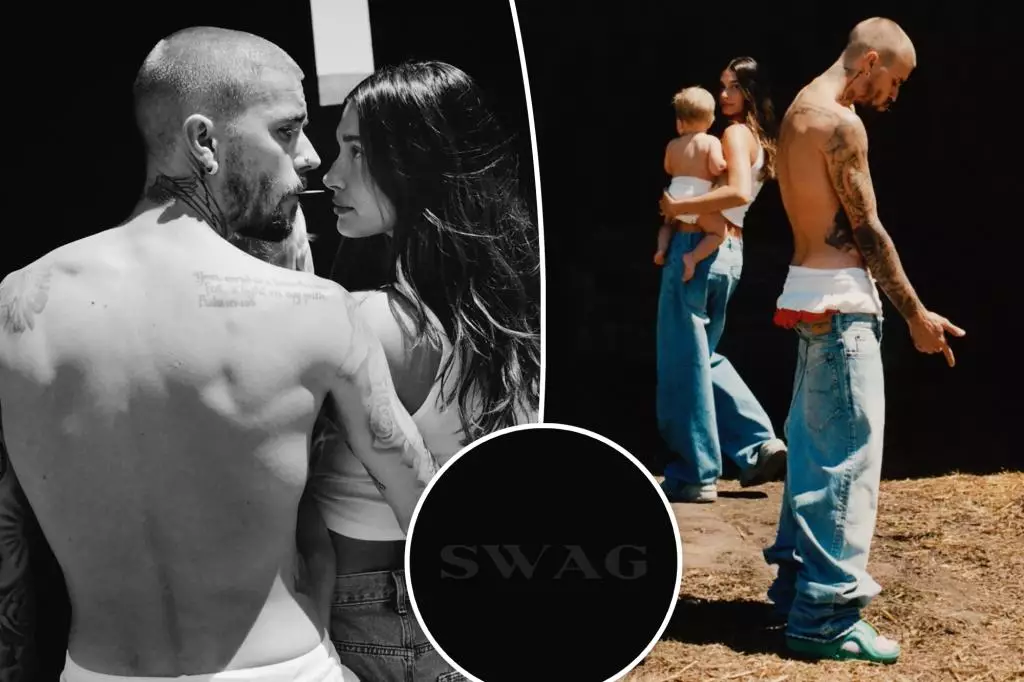Justin Bieber’s latest album, “Swag,” is more than just a collection of songs—it’s a candid window into his tumultuous personal life. Unlike many artists who shy away from vulnerability, Bieber chooses raw honesty, using his music as a medium to confront the struggles that often go unspoken in the limelight. This approach not only humanizes him but also challenges the traditional image of perfection that celebrities frequently project. In an era where social media is saturated with curated personas, Bieber’s openness signifies a refreshing push toward authenticity, reminding fans that even icons grapple with pain, doubt, and growth.
Marriage Under Scrutiny: Navigating Love in the Spotlight
The album’s emotional landscape offers a complex portrayal of Bieber and Hailey’s marriage. Songs like “Walking Away” and “Daisies” dive deep into the turbulence of their relationship, hinting at moments of doubt, testing boundaries, and the enduring effort to stay connected amidst adversity. Bieber’s lyrics suggest a man fighting to preserve his vows, emphasizing his commitment despite the cracks that have appeared. His declaration, “Baby, I ain’t walking away,” is a powerful testament to resilience, rooted in love but also acknowledging the human tendencies to falter and stumble. This communication through song reveals an internal conflict: the desire to protect his relationship but also the need for understanding and patience.
Breaking the Silence: Challenging Rumors and Cultivating Transparency
The public’s curiosity about Bieber’s marriage has been relentless, fueled by rumors about drug use, financial hardships, and relationship woes. Bieber’s decision to openly address these issues in “Swag” is a calculated yet brave move. He refuses to let speculation define his narrative, instead choosing to confront it through his art. By doing so, Bieber sends a message that genuine struggles are part of growth and that authentic dialogue can foster deeper connections—not just with fans but also within his own life. Moreover, his and Hailey’s recent social media activity, showing a united front amidst persistent gossip, underscores their resilience and commitment to one another despite external pressures.
The Cultural Implication of Vulnerability in Celebrity Culture
Justin Bieber’s album exemplifies a broader cultural shift towards vulnerability among public figures. In the past, artists tended to mask insecurities behind polished images or avoid discussing personal setbacks publicly. Today, revealing the complexities of mental health, relationship struggles, and personal growth has become a form of strength. Bieber’s candidness challenges fans to rethink their perceptions of perfection and encourages empathy. It also presses the entertainment industry to recognize the importance of mental wellness and authenticity. Bieber’s honesty is a bold statement that true strength lies in owning one’s flaws and scars, making him not only a pop star but also an advocate for vulnerability as a form of empowerment.
Love, Loyalty, and the Battle Against External Expectations
At the core of Bieber’s narrative in “Swag” is a passionate affirmation of love’s endurance. His songs do not paint a picture of a perfect relationship but rather one that is tested by external noise, personal flaws, and life’s uncertainties. Bieber’s dedication to Hailey emerges as a central theme—he openly credits her as his muse and source of strength. Yet, beneath this loyalty lies a critique of the relentless scrutiny celebrities face, where even private moments become commodities for public consumption. Bieber’s willingness to share these truths publicly—despite potential backlash—marks a pivotal moment in celebrity transparency. It invites listeners to see beyond the glossy surface and understand love’s messy, imperfect reality.
Final Reflection: A Landmark for Honest Artistry
Justin Bieber’s “Swag” stands out not merely because of its musical qualities but because of its courage. In confronting rumors, internal struggles, and personal disappointments openly, Bieber is blurring the lines between artist and individual. His approach reflects a larger societal expectation—demanding authenticity from our icons while simultaneously holding them to impossible standards. By devising such an uncompromising narrative, Bieber paves the way for a new kind of celebrity—a figure who embraces vulnerability and humanizes the often unreachable persona of fame. This album is more than music; it’s a statement that resilience, honesty, and love can coexist even in the most scrutinized spaces.

